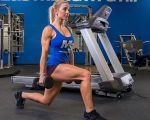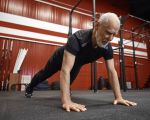- - Understanding the Role of Nutrition in Energy and Endurance
- - Key Nutrients for Long-lasting Energy
- - Pre-Workout Nutrition for Maximum Endurance
- - Post-Workout Recovery: What to Eat for Optimal Results
- - Real-Life Success Stories: How Proper Nutrition Boosted Energy and Endurance
Understanding the Role of Nutrition in Energy and Endurance
Nutrition plays a fundamental role in providing energy and sustaining endurance. Whether you’re an athlete looking to optimize performance or someone simply trying to boost energy throughout the day, the right nutrition is key to fueling your body. The foods you eat directly affect your energy levels, stamina, and recovery rate. A balanced diet full of essential nutrients can help you perform at your best, both mentally and physically.
When it comes to endurance, your body needs a consistent source of energy over an extended period. This can be achieved by focusing on nutrient-dense foods that provide steady fuel, rather than quick fixes that lead to crashes. By making informed dietary choices, you can improve your performance, increase your stamina, and maintain a high energy level throughout your daily routine. At [Fitness], we offer a variety of nutritional products that can help you achieve the energy and endurance you need to thrive.
Key Nutrients for Long-lasting Energy
The key to sustained energy lies in providing your body with the right nutrients. Here are the most important nutrients to focus on for improving energy and endurance:
Carbohydrates
Carbohydrates are the body’s primary source of energy, especially during high-intensity activities. Unlike simple sugars that cause a quick energy spike and crash, complex carbohydrates provide a steady release of glucose into the bloodstream. Whole grains, fruits, vegetables, and legumes are all excellent sources of complex carbs that support sustained energy.
Proteins
Proteins are essential for muscle repair and recovery, making them a critical nutrient for endurance athletes. They also help maintain energy levels over time. Consuming moderate amounts of lean proteins—such as chicken, fish, tofu, or beans—can help you stay energized while supporting muscle growth and recovery.
Fats
While fats have a bad reputation, healthy fats—such as those found in avocados, nuts, seeds, and olive oil—are an important part of an energy-efficient diet. Fats provide a long-lasting, slow-burning source of energy, especially during prolonged activities. Including healthy fats in your meals can help support your energy levels during extended workouts or long days of activity.
Micronutrients
Vitamins and minerals also play a significant role in energy production. B vitamins, particularly B12 and folate, are involved in converting food into energy. Iron is crucial for transporting oxygen in the blood, and magnesium supports muscle function. Eating a varied diet rich in vegetables, fruits, and lean proteins will ensure you get the necessary micronutrients for endurance.
Pre-Workout Nutrition for Maximum Endurance
What you eat before a workout can significantly impact your performance and stamina. Proper pre-workout nutrition helps fuel your body, stabilize blood sugar levels, and reduce muscle fatigue. Here's how to prepare your body for maximum endurance:
Timing and Balance
It’s best to eat a balanced meal 2-3 hours before your workout, which includes a mix of complex carbohydrates, lean protein, and healthy fats. This combination provides a steady release of energy and helps prevent muscle breakdown. If you’re in a rush, a small snack like a banana with peanut butter or a whole-grain toast with almond butter can offer a quick, energy-boosting option.
Hydration
Proper hydration is just as important as food when it comes to boosting energy and endurance. Dehydration can lead to fatigue, muscle cramps, and decreased performance. Drink plenty of water before and during your workout to keep your body hydrated and functioning optimally.
Avoid Sugary Foods
While it may be tempting to grab a sugary snack before a workout, it’s best to avoid simple sugars. These provide a quick burst of energy but lead to a crash shortly after, which can affect your stamina during exercise. Stick to whole foods that provide slow-releasing energy.
Post-Workout Recovery: What to Eat for Optimal Results
Post-workout nutrition is just as crucial as pre-workout fuel. After intense exercise, your body needs to replenish glycogen stores, repair muscle fibers, and reduce inflammation. Here’s what to focus on for effective recovery:
Carbohydrates and Proteins
After exercise, the body needs both carbohydrates to replenish glycogen stores and protein to repair and rebuild muscles. A 3:1 ratio of carbohydrates to protein is often recommended for optimal recovery. A good example is a protein smoothie with fruit, or a turkey sandwich with whole-grain bread.
Rehydration
It’s also important to rehydrate post-workout, especially after long sessions or intense exercise. Water is essential, but you may also want to include a recovery drink with electrolytes to help replace sodium, potassium, and other minerals lost through sweat.
Anti-Inflammatory Foods
Incorporating anti-inflammatory foods, such as cherries, turmeric, ginger, and omega-3-rich fish, can help reduce muscle soreness and speed up recovery. These foods contain compounds that help decrease inflammation and support faster healing of muscle tissue.
Real-Life Success Stories: How Proper Nutrition Boosted Energy and Endurance
Many athletes and everyday individuals have seen significant improvements in their performance and energy levels by following proper nutrition strategies. Take, for example, Emily, a marathon runner who was struggling with energy dips halfway through her races. After consulting with a nutritionist and adjusting her pre- and post-race meals, she was able to increase her endurance and finish her races feeling stronger and more energized.
Similarly, John, an office worker who was often fatigued by the afternoon, adopted a balanced eating plan with healthy snacks and hydration throughout the day. By incorporating nutrient-dense meals and staying hydrated, John was able to maintain steady energy throughout his workday and no longer relied on caffeine or sugary snacks for a boost.
These success stories demonstrate the impact that good nutrition can have on both athletic performance and everyday energy levels. By focusing on the right balance of macronutrients and micronutrients, anyone can improve their energy, endurance, and overall well-being.
For expert nutrition advice and products tailored to your energy and endurance needs, visit [Fitness], where we offer a wide range of supplements, snacks, and guides to help you fuel your body for optimal performance.








